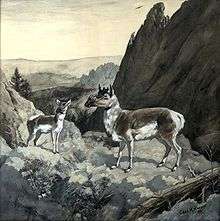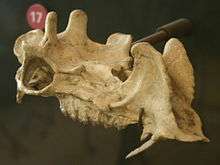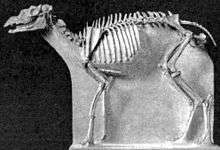Protoceras
Protoceras ('first horns') is an extinct genus of Artiodactyla, of the family Protoceratidae, endemic to North America. It lived from the Oligocene to the Early Miocene 33.3—16.0 Ma, existing for approximately 17 million years.[1]


| Protoceras | |
|---|---|
 | |
| Protoceras celer skeleton | |
| Scientific classification | |
| Kingdom: | Animalia |
| Phylum: | Chordata |
| Class: | Mammalia |
| Order: | Artiodactyla |
| Family: | †Protoceratidae |
| Subfamily: | †Protoceratinae |
| Genus: | †Protoceras Marsh, 1891 |
| Type species | |
| Protoceras celer | |
| Species | |
| |
Morphology
Protoceras was 1 metre (3 ft 3 in) long and resembled a deer in terms of body shape. Like some other protoceratids it had three pairs of blunt horns on its skull. In life these were probably covered with skin, much like the ossicones of a giraffe. Protoceras was sexually dimorphic - females only had one pair of horns, on the back of the skull, which was shorter than the same pair in males. Males probably used these horns for display, impressing females and/or intimidating rivals. Due to the orientation of the horns the males probably displayed them sideways instead of frontally.[2]
Protoceras was one of the earliest and most primitive protoceratids, still possessing upper incisors and four functional toes (later genera had only two functional, hooved toes). It lived in the deserts of the Late Oligocene, alongside the oreodont Leptauchenia.
References
- Protoceras at fossilworks
- Palmer, D., ed. (1999). The Marshall Illustrated Encyclopedia of Dinosaurs and Prehistoric Animals. London: Marshall Editions. p. 272. ISBN 1-84028-152-9.